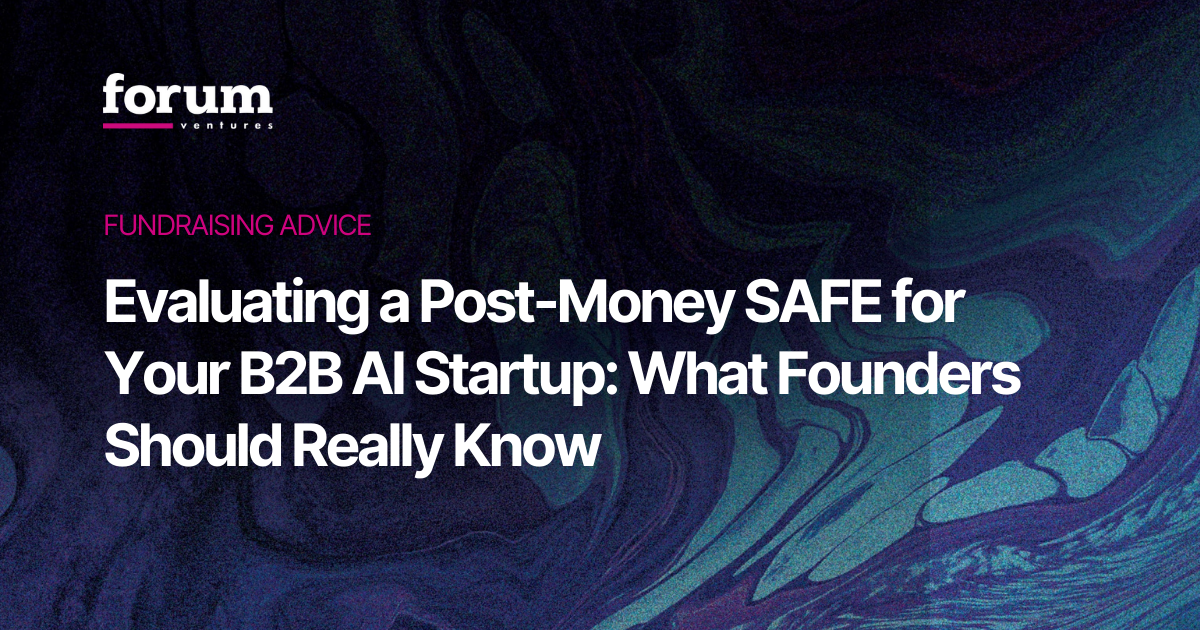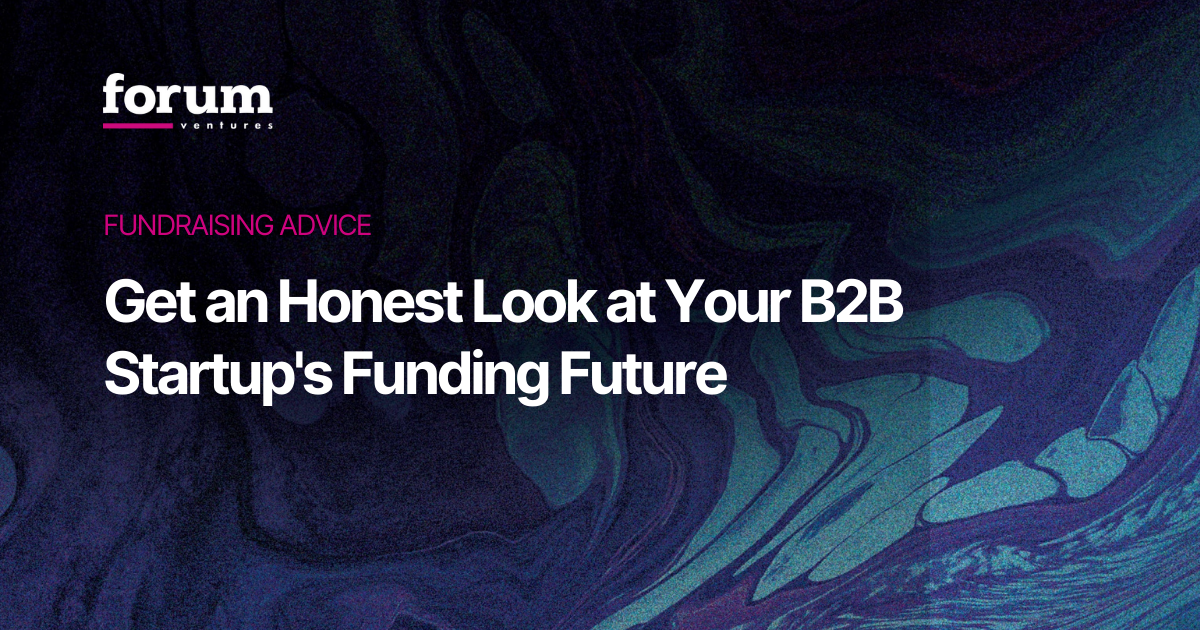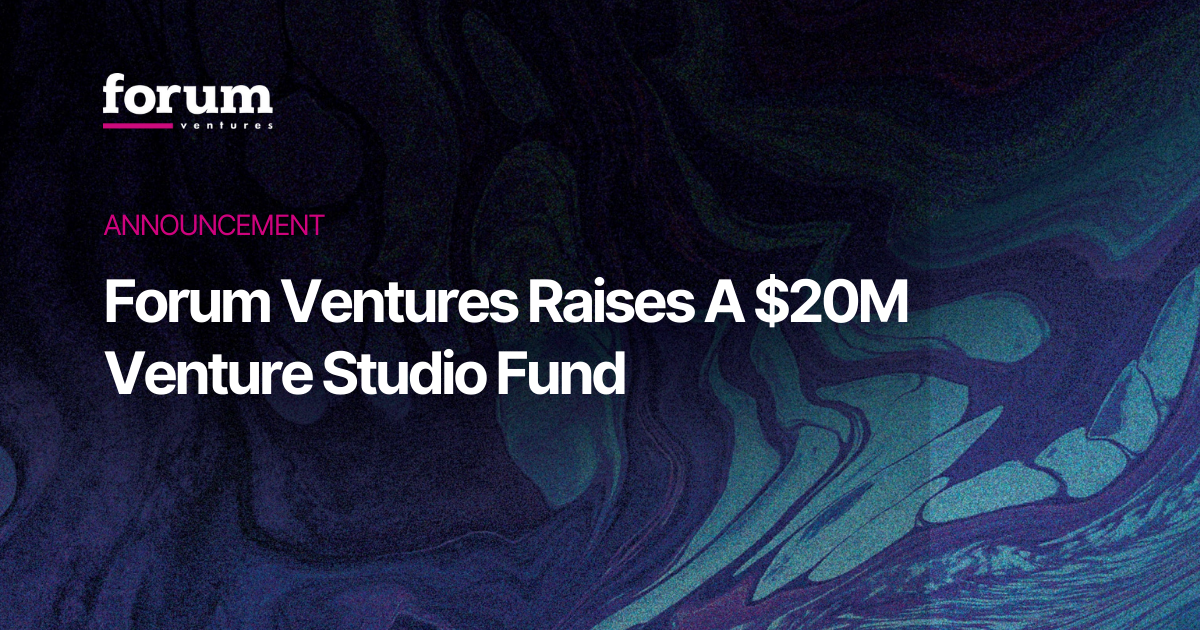
The early-stage venture capital landscape for B2B SaaS startups continues to evolve in 2025, marked by a mix of cautious optimism, capital efficiency, and a focus on team-driven investments. At Forum Ventures’ recent panel event, top NYC investors shared their insights on fundraising, market conditions, and what it takes for founders to succeed in today’s environment. This event was the official launch of our latest report "State of the VC Market: Pre-seed and Seed 2024", which uncovers insights from 300+ pre-seed and seed deals closed between January and October 2024.
Panelists included:
- Brian Hollins, Founder and Managing Partner @ Collide Capital
- Kelley Mak, GP @ Work-Bench
- Jenny Fielding, GP @ Everywhere Ventures
- Olivia O’Sullivan, Partner @ Forum Ventures (Moderator)
Below, we break down the trends and key takeaways they shared that founders need to know.
1. Raise for Resilience: How do I Create a Longer Runway?
Across the board, our panelists emphasized that in the current market, founders need to focus on capital efficiency and longer runways. As Jenny Fielding from Everywhere Ventures put it, "It's no longer unusual to raise for 24-30 months of runway. Investors want to fortify companies so they can survive volatility."
Founders must adjust their fundraising strategies to accommodate longer timelines and uncertainty:
- Raise slightly larger rounds: “Investors now expect founders to raise for 24-30 months of runway,” Jenny explained. This approach gives startups the breathing room to execute pivots, navigate market challenges, and avoid frequent fundraising cycles.
- Reprogram your mindset on spending: Founders need to embrace capital efficiency by focusing on minimum viable spend. “More capital isn’t always better,” Jenny noted. Instead, the goal should be sustainable growth and adaptability.
Brian Hollins, Managing Partner at Collide Capital, echoed these sentiments, stressing the importance of consistency and execution. “You need to show you can execute on milestones quarter over quarter. Investors are looking for teams that can achieve repeatable results in a less forgiving fundraising environment.”
Key takeaway: Raise for resilience. Plan for longer runways and show investors you can achieve sustainable milestones with the capital you raise.
2. How to Plan Around Fundraising Seasons to Maximize Success
Timing is everything when it comes to fundraising. Jenny provided practical advice on when founders should target their rounds, based on seasonality:
- The best times to raise are mid-January through mid-May and post-Labor Day through Thanksgiving. These windows align with when VCs are most active, back in the office, and focused on deploying capital.
- Avoid fundraising during the summer or December. “Even if some investors say they’re available, deals often drag due to vacations and slower team dynamics,” Jenny noted.
From a business standpoint, founders should ensure their companies are ready to capitalize on these seasonal windows by having their investor pipeline built, materials prepared, and traction demonstrated.
Key takeaway: Fundraising has seasons. Be prepared to hit the ground running during peak windows, and time your efforts to align with investor availability.
3. What do VCs Want? Criteria for Early-Stage Investment Decisions
The panelists unanimously agreed that at the pre-seed and seed stages, the team is the single most important factor in determining investment decisions. Teams with resilience, adaptability, and speed in processing new information tend to fare better in the unpredictable startup terrain.
Jenny summed it up succinctly: “For us, it’s team, team, team. You can’t predict where a company will go, but you can back resilient, fast-moving founders who iterate quickly and respond to challenges.”
Brian added that understanding a founder’s motivations and resilience is essential: “Why is this founder building this company? Are they ready for the seven-to-ten-year journey ahead?”
What do Investors Evaluate?
While many founders ask, "What’s the magic number for traction?" the reality is more nuanced. Kelley Mak from Work-bench explained that for seed-stage investments, his team evaluates four main pillars for evaluating early-stage startups:
- Team: The founder’s lived experience, resilience, and ability to build and adapt.
- Product: Proof that the solution is solving a real problem.
- Market: A clear, scalable market opportunity.
- Traction: Evidence of progress and momentum, whether that’s revenue, customer feedback, or product adoption.
“For seed-stage companies, we look for three of these four pillars. For pre-seed, we can lean more heavily on the strength of the team and market opportunity,” Kelley explained.
The Role of Domain Expertise and Customer Validation
For sectors like infrastructure, deep domain expertise is critical. The importance of founders with lived experience and domain expertise came up repeatedly. As Kelley noted, “We back founders who’ve lived the problem they’re solving.” He cited examples of founders from his portfolio who have deep knowledge of their target industries, such as infrastructure and cybersecurity.
Brian added that customer insights play a crucial role in early-stage validation:
- “Even with a small handful of customers, we want to understand the ROI your product delivers,” he said.
- He also emphasized spending time with executive team members to assess leadership dynamics and the ability to scale a business.
Key takeaway: For early-stage founders, your team’s grit and expertise are your most valuable assets. Back this up with customer insights and a clear go-to-market strategy to build investor confidence.
4. AI: Hype or Transformational?
Unsurprisingly, AI dominated the conversation on market trends. The influx of AI startups has created an oversaturated market, making it harder for companies to stand out. While many investors remain bullish on AI, the panelists emphasized discipline and differentiation.
Not All Investors Are AI-Focused
Jenny clarified that Everywhere Ventures doesn’t invest in AI-specific businesses. Instead, they focus on startups solving real-world problems in sectors like healthcare, fintech, and climate. “AI is an enabling technology—it’s not the business itself,” she explained. Founders in other sectors should view AI as a tool to enhance their solutions rather than a reason to rebrand as “AI-first.”
AI Investment Strategies
Brian shared Collide Capital’s disciplined approach to AI:
- "We look for differentiated solutions that leverage AI to solve real problems," he said, providing examples like Slang.ai, which uses AI to streamline voice customer support for restaurants.
- He cautioned against chasing trends: “Don’t build an AI business just because it’s hot. Build something that stands out in a crowded space.”
Key takeaway: If you’re in AI, or other competitive sectors, focus on differentiation and solving tangible problems. For founders in other sectors, leverage AI strategically without over-indexing on trends.
5. How do You Set Realistic Valuations? Balancing Art and Science
One of the most common questions from founders is how to price their round. The panelists agreed that valuation is a blend of art and science.
Valuation of startups, especially in hot sectors like AI, poses a complex challenge for both investors and founders. While some might view valuation more as an art influenced by present trends, others look at team capabilities, traction, and unique insights into market problems. At Workbench, the pricing strategy for rounds involves a balance of evaluating market trends and inherent team potential.
Kelley noted that factors like team strength, market size, and product defensibility heavily influence valuations. “In hot sectors like AI, inflated valuations are common, but that doesn’t necessarily reflect the company’s long-term potential.”
Brian advised founders to focus on storytelling and demonstrating lived experience:
- “If you’re early in customer validation, help investors understand your unique insights into the market. Show them why you’re the right person to solve this problem.”
Key takeaway: Anchor your valuation on fundamentals like team strength, traction, and market opportunity. Avoid chasing inflated benchmarks that may not be sustainable.
6. How to Build Relationships with Investors: Do Your Homework
A recurring theme was the importance of relationship-building. The panelists stressed the importance of targeting the right investors for your business. Brian encouraged founders to go deeper than just looking at firms: “Look at individual investors within the fund. Who shares your background? Who writes about your industry? Build relationships early.”
Jenny emphasized the value of building trust over time: “We try to get to know founders long before they’re raising. If you’re not actively fundraising, use this time to network and introduce yourself to investors in a low-pressure way.”
Key takeaway: Fundraising is as much about relationships as it is about metrics. Start networking early and target investors who are aligned with your mission.
Conclusion: The 2025 Playbook for B2B SaaS Founders
The 2025 fundraising environment requires founders to be more strategic, disciplined, and resilient than ever. Startups must prove their ability to adapt, execute consistently, and solve real-world problems. Investors, meanwhile, are approaching deals with increased scrutiny, prioritizing strong teams and sustainable growth.
Whether you’re raising your first round or scaling to seed, by focusing on the fundamentals, building the right relationships, and showcasing resilience, you’ll be better positioned to navigate the challenges ahead.
To dive deeper into the data from these findings, check out the "State of the VC Market: Pre-seed and Seed 2024" report.
For more tactical advice and resources for B2B SaaS founders, check out The Midnight Text - a bi-weekly newsletter that provides honest answers to the unspoken questions that keep founders awake at (mid)night.
Let’s build the future together.






FAQ: Key Trends and Fundraising Advice for B2B SaaS Founders in 2025
1. How long should I aim for my runway when fundraising in 2025?
In 2025, it's recommended that founders raise for 24-30 months of runway. This extended timeline provides more breathing room for executing pivots, managing market challenges, and avoiding the need for frequent fundraising cycles. Investors want to ensure that your startup can navigate volatility without running out of capital too soon.
2. When is the best time to raise capital for a B2B SaaS startup?
The ideal fundraising seasons are mid-January through mid-May and post-Labor Day through Thanksgiving. These periods align with when VCs are most active and focused on deploying capital. It's best to avoid summer and December, as many investors are on vacation, leading to slower deal progress.
3. What do investors look for in early-stage B2B SaaS startups?
Investors prioritize the team above all else. A resilient, adaptable, and fast-moving team is crucial for success. Beyond that, they also evaluate product-market fit, traction, and a scalable market opportunity. For pre-seed startups, the focus may be more on the strength of the team and the market opportunity rather than product traction.
4. How important is AI in the fundraising process for SaaS startups?
AI is a growing trend in the market, but it's not the primary focus for many investors. While AI can be an enabling technology, founders should use it strategically to solve real-world problems in their respective sectors. For founders in non-AI-focused industries, it's best to avoid over-indexing on AI trends and focus on building differentiated solutions.
5. How should I set the valuation for my early-stage SaaS startup?
Valuation should be a balance of both art and science. Factors like team strength, market opportunity, product defensibility, and traction play a significant role. While sectors like AI may have inflated valuations, it's important to focus on long-term potential rather than chasing short-term trends.
6. What’s the best way to build relationships with investors before fundraising?
Start networking early, even before you're actively raising funds. Get to know individual investors within firms who share your background or interest in your industry. Building a relationship over time is key, as investors prefer to have a history with founders before committing to an investment.
7. What should I focus on when pitching my startup to investors in 2025?
Focus on demonstrating resilience, capital efficiency, and sustainable growth. Show that your team can execute on milestones consistently, and emphasize how your solution solves a real problem in a scalable market. Investors want to back teams that can weather uncertainty and achieve repeatable results.
.avif)
.avif)



.svg)




.avif)

